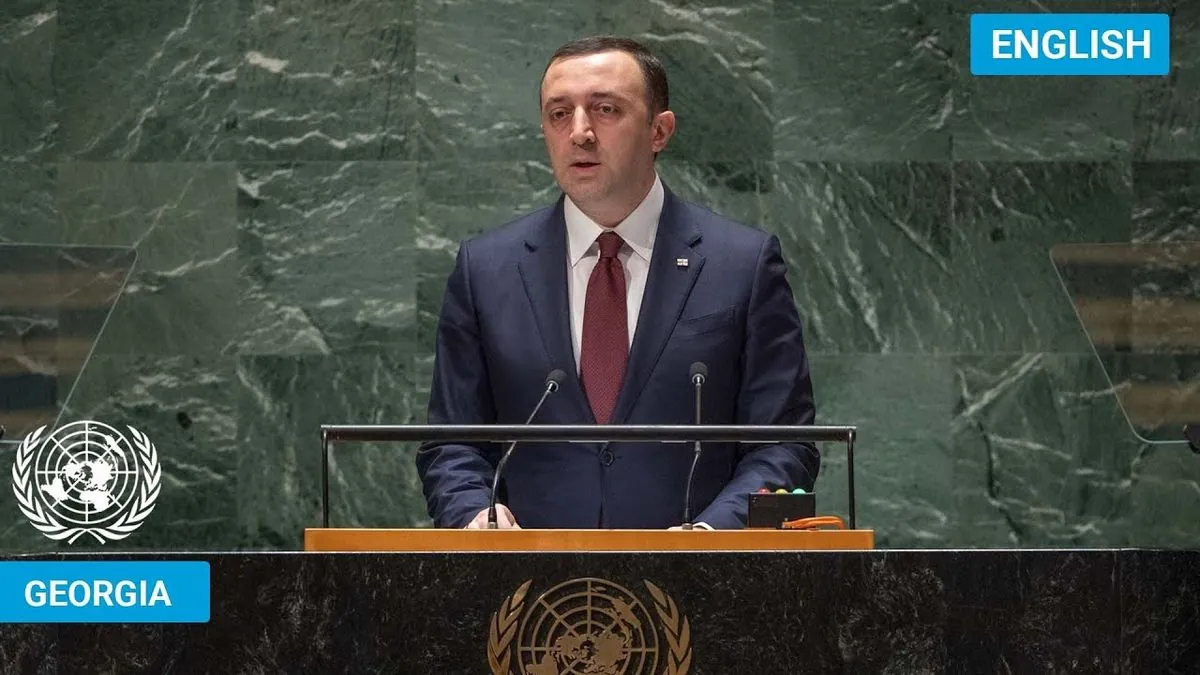In a significant diplomatic development, Irakli Kobakhidze, the Prime Minister of Georgia, has been excluded from a reception for world leaders hosted by U.S. President Joe Biden during the United Nations General Assembly (UNGA). This incident, reported by Georgian media on September 25, 2024, marks a notable decline in U.S.-Georgian relations.
Georgian officials confirmed that Kobakhidze's initial invitation to the reception was rescinded by the United States. The U.S. embassy in Tbilisi cited the Georgian government's "anti-democratic actions, disinformation, and negative rhetoric towards the U.S. and the West" as reasons for the withdrawal. This decision comes just one day before Kobakhidze's scheduled address to the UNGA.
The disinvitation highlights the growing tensions between Georgia and its Western allies. Since gaining independence from the Soviet Union in 1991, Georgia has been a significant recipient of U.S. aid and has generally maintained a pro-Western stance. However, recent actions by the Georgian government have raised concerns among Western powers.
One of the primary sources of contention is the "foreign agents" law passed by the ruling Georgian Dream party in June 2024. This legislation, reminiscent of similar Russian laws used to suppress dissent, has been widely criticized by Western countries. The law's passage has contributed to accusations that the Georgian government is leaning towards authoritarian and pro-Russian policies.
The political landscape in Georgia is further complicated by the upcoming parliamentary elections in October 2024. The Georgian Dream party, which has been in power since 2012, is seeking a fourth term. Recent opinion polls suggest that while Georgian Dream remains the most popular party, its support has declined since the 2020 elections, where it secured nearly 50% of the vote.
"President Biden is attempting to provide an electoral 'lifeline' to the Georgian opposition."
This statement reflects the growing divide between the Georgian government and its Western partners. The ruling party has faced criticism for suggesting a potential ban on the pro-Western opposition United National Movement if re-elected.
The deterioration in Georgia's relations with Western countries has led to concrete consequences. Earlier this month, the United States imposed sanctions on two Georgian police commanders allegedly involved in violence against protesters during demonstrations against the foreign agent law. Additionally, the European Union has warned that it may suspend its visa-free regime for Georgian citizens if the October elections are not conducted freely and fairly.
These developments occur against the backdrop of Georgia's complex geopolitical position. The country, with a population of approximately 3.7 million, shares borders with Russia, Turkey, Armenia, and Azerbaijan. Its strategic location and aspirations for closer ties with the West have often put it at odds with neighboring Russia, as evidenced by the brief war in August 2008 over South Ossetia and Abkhazia.
Despite these challenges, Georgia has made significant strides since its independence. The country joined the World Trade Organization in 2000 and has been a member of the Council of Europe since 1999. In a major milestone, Georgia was granted EU candidate status on December 15, 2023, following its application for membership on March 3, 2022.
As Georgia navigates these diplomatic tensions, it continues to balance its rich cultural heritage with its aspirations for Western integration. The country is renowned for its 8,000-year-old winemaking tradition and is home to one of the world's oldest Christian churches, the Georgian Orthodox Church. Tbilisi, the capital founded in the 5th century AD, exemplifies this blend of history and modernity.
The outcome of the October elections and the government's response to Western concerns will likely play a crucial role in shaping Georgia's future relationships with its international partners. As the country approaches this critical juncture, the world watches to see how it will balance its domestic politics with its international aspirations.
